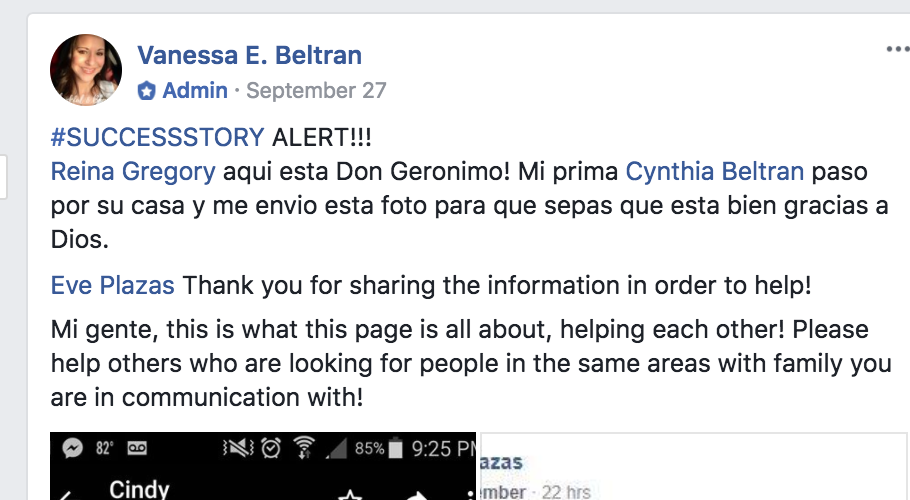COLLEGE PARK, Maryland — Patricia Pichardo, who lives in Atlanta, Georgia, went to sleep a few hours after midnight on the day Hurricane Maria struck Puerto Rico. She was not expecting significant devastation.
By the time she woke up, she had lost all contact with her sister who lives in Caguas, Puerto Rico. Her Facebook feed, where she would normally see Puerto Rico memes and other posts from friends, had become eerily empty.
“It’s almost like a Facebook newsfeed blackout,” Pichardo said.
Unable to find specific information about Caguas or anything about her sister’s whereabouts, Pichardo decided to try to her luck by creating a Facebook group. Her goal was to bring together friends, and friends of friends, who might have updates about specific towns on the stricken island.
“My goal was to find my sister,” said Pichardo, who works as director of product management at Listen360, a software company in Alpharetta, Georgia.
The group, called Puerto Rico Maria Updates, now has more than 200,000 members. The Facebook page by the same name, which is linked to the group, has 25,008 likes from users across 46 different countries.
More than 22,000 of those users live in the United States, while roughly 1,750 of the page likes are from users in Puerto Rico.
Between these two communities, Pichardo had her hands full. And because Facebook groups require authorization to join, Pichardo and her team of administrators went through thousands of requests.
“My motto was always: the more people we have in here, and the more users are sharing their news here, as opposed to our personal pages, the more we benefit in the collective,” Pichardo said.
Within the first four days, around 180,000 people joined the group, Pichardo said.
In an attempt to highlight certain information, users and administrators have been including the hashtag #successstory to mark posts about family members who have been found.

The slogan of the group is “neighbors helping neighbors,” which comes from the group’s original purpose: helping Puerto Ricans find their loved ones who had no other means of communication.
In their posting guidelines, published shortly after the group was launched, Pichardo instructed users to be as thorough as possible when requesting information or posting about missing loved ones. She also encouraged members to search the group to avoid duplicate posts.
To stay organized, users who had reliable information about a particular town could enter it in a spreadsheet shared by the administrators. The spreadsheet has now been incorporated into an app that can be used to search updates by town.
Though the group is a generally helpful and positive community, Pichardo’s team of administrators is always on the lookout for trolls or users who post “fake news.” When a user consistently posts false stories, Pichardo messages the user that he or she is posting from unreliable sources.
“We will not allow the voices of people who need this page to be drowned by politicking, vulgarity, and ‘fake news’ reports. Be considerate and respectful and help each other,” the group guidelines read.
In the end, Pichardo was able to find her sister with the help of a team of Univision reporters who were working in Puerto Rico.
Pichardo continues to use the group and page to support those in Puerto Rico. She is currently working on a fundraising campaign, which will help deliver donations to the island for the holidays. Members from the Puerto Rico Maria Updates can donate $5 dollars.
“Five dollars doesn’t seem like much and it isn’t much, but with 250,000 community members, $5 is a lot of money,” Pichardo wrote in her post.





You must be logged in to post a comment.